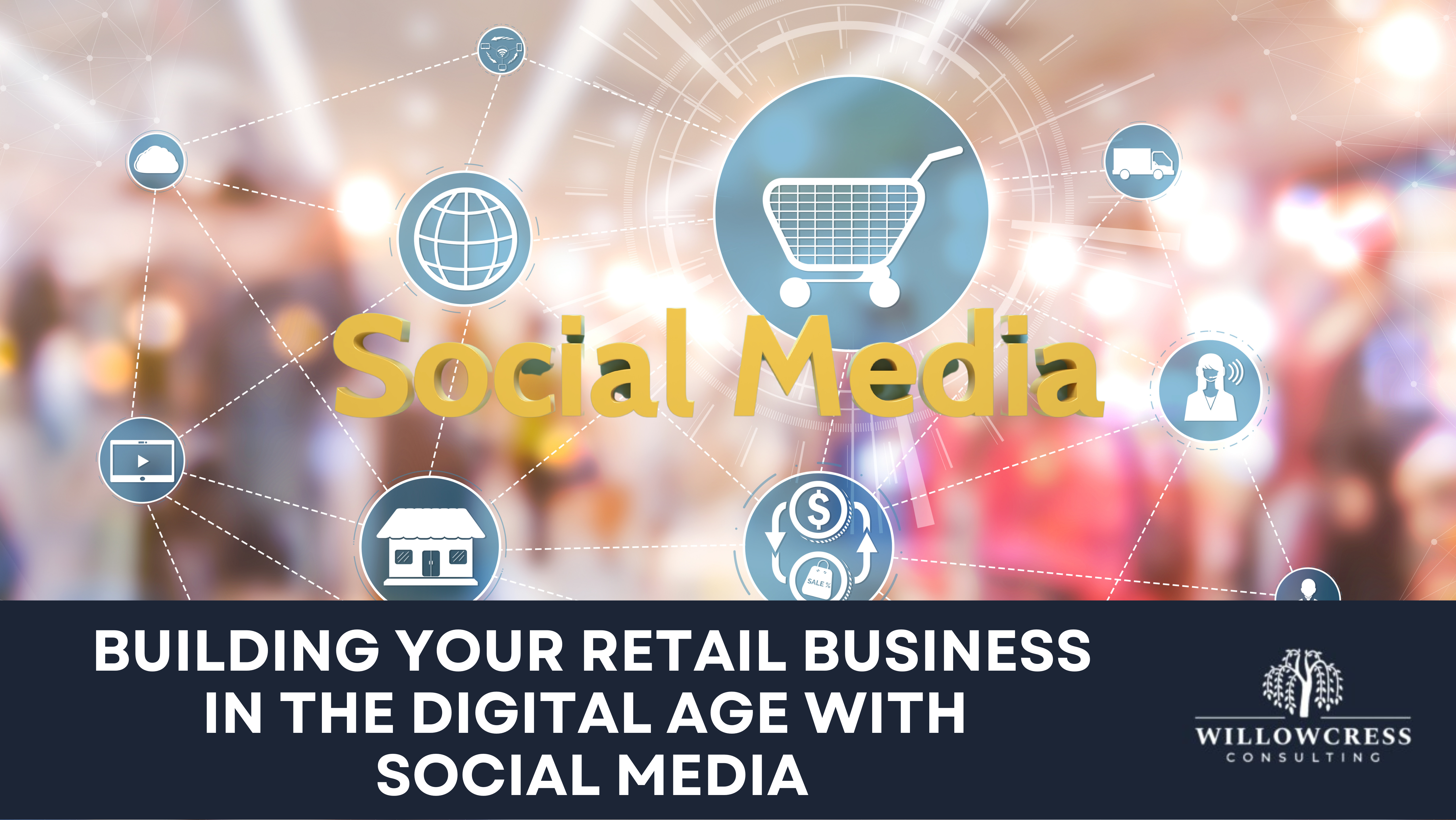Home / Social Media / Building Your Retail Business ...

The retail landscape has undergone a dramatic transformation in the digital age. Traditional brick-and-mortar stores now compete with a vast online marketplace, where customers have the convenience of shopping from their homes and a plethora of choices at their fingertips. With evolving customer expectations, it’s crucial for retail businesses to establish a strong online presence to stay relevant and competitive. Social media has emerged as a powerful tool to not only build brand awareness but also enhance customer engagement and drive sales. By leveraging the right social media strategies for retail business, retailers can effectively navigate this digital era and thrive.
To make the most out of social media, retailers need to identify platforms that align with their target audience and brand identity. Facebook remains a staple for reaching a broad demographic, offering diverse advertising options and detailed analytics. Instagram, with its visual-centric approach, is perfect for showcasing products through high-quality images and stories. TikTok, the newest contender, appeals to younger audiences with short, engaging videos that can go viral. Understanding where your customers spend their time and tailoring your presence accordingly is crucial.
Each platform has unique features that can be utilized to enhance your marketing efforts. Facebook’s ad manager allows for highly targeted ads based on user behavior and demographics. Instagram’s shopping feature enables direct purchases from posts, while TikTok’s algorithm promotes discoverability through trending content. Familiarizing yourself with these features ensures that you are leveraging each platform’s full potential.
Before diving into social media, establish clear objectives that align with your overall business goals. Are you aiming to boost brand awareness, increase website traffic, generate leads, or drive sales? Defining these goals helps in crafting focused strategies. For instance, if your goal is to enhance brand awareness, your content should emphasize storytelling and showcase your brand’s personality.
Different platforms cater to various demographics, so it’s essential to align your goals with the specific audiences you’re targeting. Tailor your content to address the interests and preferences of your audience on each platform. For example, Instagram might be ideal for visually appealing product showcases, while Facebook could be better for community engagement and detailed posts.
Visual content is key in social media marketing. High-quality photos and videos that showcase your products in appealing settings can capture attention and drive interest. Ensure that your visuals are well-lit, professionally shot, and highlight the features and benefits of your products effectively.
Storytelling helps create a connection with your audience. Share stories about your products, customer experiences, or behind-the-scenes glimpses of your brand. User-generated content, such as customer reviews and photos, can further engage your audience and build trust.
Different content formats can keep your audience engaged. Live streams and product demonstrations allow for real-time interaction and showcase your products dynamically. Behind-the-scenes content can humanize your brand and build a stronger connection with your audience.
Informative content helps educate your customers about your products. Highlight unique features, benefits, and solutions your products offer. This type of content can also address common customer questions and concerns, positioning your brand as an expert in your field.
Interactive content such as polls, quizzes, and contests can generate excitement and boost engagement. These activities encourage participation and provide valuable insights into your audience’s preferences.
Share your brand’s story, values, and mission through social media storytelling. Connecting on an emotional level with your audience can foster loyalty and deepen your relationship with customers.
Social media advertising allows you to target specific demographics and locations, making it easier to reach potential customers who are most likely to be interested in your products. Tailor your ads to highlight special offers and promotions to entice purchases.
Use your social media channels to introduce new products and announce exciting promotions or discounts. Creating buzz around these updates can drive traffic to your store and increase sales.
Instagram Shopping enables users to purchase products directly from your posts. This feature provides a seamless shopping experience and can drive sales by reducing friction in the purchasing process.
Demonstrating responsiveness to comments, messages, and reviews builds trust and shows that you value customer feedback. Effective customer service through social media can enhance your brand’s reputation and foster loyalty.
Interactive campaigns like “Ask Me Anything” sessions can facilitate communication and build trust with your audience. These campaigns provide opportunities for real-time engagement and address customer inquiries directly.
Reward repeat customers through loyalty programs promoted on social media. Offering exclusive discounts or perks to loyal followers can increase customer retention and encourage repeat business.
Social media analytics tools provide valuable insights into key metrics such as reach, engagement, website traffic, and conversions. Analyzing this data helps you understand what’s working and where improvements can be made.
Track which content types and strategies resonate best with your audience. This information allows you to refine your content approach and focus on what drives the most engagement and conversions.
Stay updated with social media trends and adapt your strategy accordingly. Continuous monitoring and refinement based on data insights ensure that your approach remains effective and aligned with your goals.
Maintain a regular posting schedule to keep your audience engaged and informed. Consistency helps build anticipation and ensures that your brand remains top-of-mind.
Partner with influencers who align with your brand and target audience. Influencer collaborations can amplify your reach and introduce your products to new potential customers.
Learn from successful campaigns and strategies within your industry. Monitoring competitors and industry trends can provide valuable insights and inspiration for your own social media efforts.
Measure the return on investment (ROI) for your social media activities. Evaluating the effectiveness of your campaigns justifies budget allocation and informs future marketing strategies.
Leveraging social media effectively is essential for building a successful retail business in the digital age. A strategic, data-driven approach can significantly enhance brand awareness, customer engagement, and sales. Embrace the opportunities that social media offers and unlock your retail business’s full potential for growth and success. Start exploring these strategies today and watch your business thrive in the ever-evolving digital landscape.
Fill out the form below and we’ll give you a call to learn more about your goals and how we can help.
You can see how this popup was set up in our step-by-step guide: https://wppopupmaker.com/guides/auto-opening-announcement-popups/
